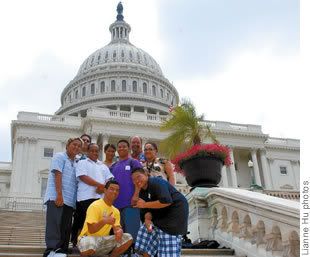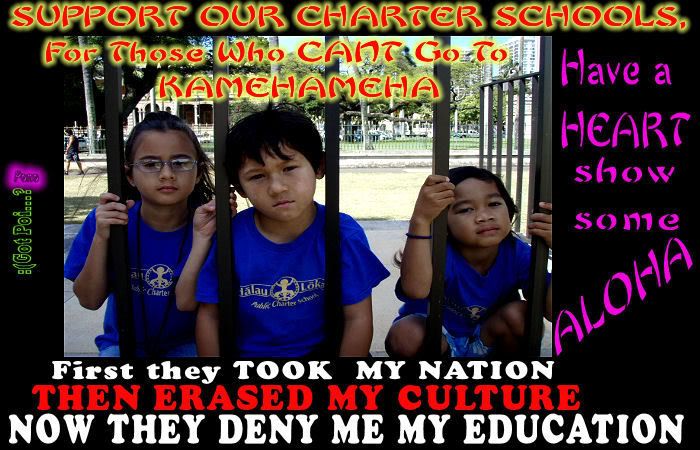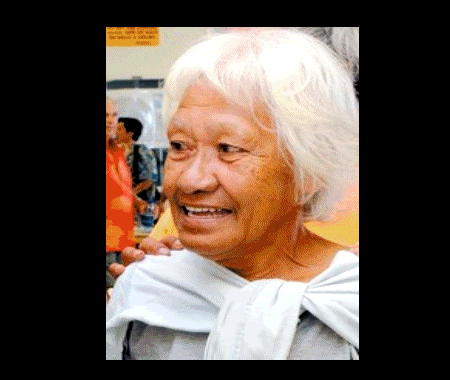‘Olelo’s Waianae Teen Video Program Is So Successful, Members Went To The Nation’s Capital To Teach Others 
Students from ‘Olelo’s Waianae Community Media Center (CMC) headed back to the classroom for a week during their summer vacation. But rather than sitting behind a desk taking notes, they were the ones conducting workshops and leading discussions - with the bigwigs in Washington, D.C., no less.
These lucky teens were invited to take part in the annual Alliance for Community Media’s (ACM) international conference, thanks to the groundbreaking success of ‘Olelo’s Waianae Media Enrichment Program. Through this program, which serves students from all 14 schools along the Leeward coast, these youths have served as role models in teaching media arts that are grounded in Hawaiian culture, values and traditions.
(’Olelo Community Television provides resources and an outlet for people to voice their opinions, ideas and stories about issues of importance in hopes of building, convening and strengthening community bonds. It is a private nonprofit with six cable channels and six neighborhood Community Media Centers on Oahu, in which ‘Olelo offers video training, facilities, resources and production support.)
“Each of the (’Olelo) community centers are different, and here in Waianae, they do see it as their community center,” says ‘Olelo president and CEO Keali’i Lopez. “It really is just the students understanding that they can tell positive stories and really make a difference through their own perspectives.”
This particular story begins months before the conference kicked off in early June. To prepare, the students had months of interview training to endure. Then there was the plane ride itself, a first for most of the students on board. Add to that the excitement of being in the nation’s capital and the pressure of being the first Hawaii students to teach at this annual conference, which attracts more than 500 attendees from the nation and world, and no doubt there were many sleepless nights in store for this bunch.
“We didn’t go to sleep until 3 a.m. because we were trying to map out our questions and figure out what would be the best approach for each one. We realized that we’ll probably never get the chance to meet with these guys again or get the chance to go to Washington, D.C., again, so we really wanted to make sure we’d have something to show when we came back home,” says ‘Olelo Waianae college intern manager Naturalee Puou.
As an intern manager, Puou was among two other young adults placed in charge of the four high school students hand-selected to participate in the conference. One of the first to-dos was to open (and close) the ACM conference by performing a traditional Hawaiian drum ceremony. To mark the significance of their trip, they created a naming chant, or oli, for the pahu (drum), Kia’i I Ka Leo, which means “to protect the voice.” The pahu was first given to the ACM when Hawaii was the host city in 1994. Each year since, it has been presented to conference participants and the next year’s planning committee.
“What was fortunate for us is that the planning committee from Washington, D.C., asked us to hold on to the pahu during the conference before passing it on to next year’s committee,” says intern Christian Naho’opi’i-Hose. “I think that’s what got them excited, that this was the first time they were entrusted with something so sacred to the Hawaiian culture, so that was a self-esteem boost for the whole group.”
With newfound confidence, students cooly instructed adult participants in advanced video editing techniques (Final Cut Pro) and contributed to a “Report from the Hill” presentation. Puou and a few of the students had the chance to speak oneon-one with congressional delegates - including Sens. Daniel Inouye and Daniel Akaka and Reps. Neil Abercrombie and Mazie Hirono.
“I think it was really special for them (the delegates) to have seen all of these youths from Hawaii come up to them for a change,” said the Nanakuli ‘06 grad now working toward her degree in teaching.
Puou was joined by Lopez during a workshop discussion on the role community access centers play in amplifying social justice and local community issues in the face of increased media consolidation and a shrinking media environment for independent voices.
“The fact that young people have pride in themselves is the benefit of this,” explains Lopez. “Yes, they learn video and they’re able to tell these stories. But they’re also able to show to the world who they are, where they come from and why they’re proud of their community. And that’s like major ambassadorship work, but it’s also to the degree in which they see themselves as stewards for the future.
“There are people who want this program to go to Alaska and work with native Alaskan youth, or elsewhere. It’s so exciting and it’s so fulfilling and you want it for everyone, but you can’t do it all like (snaps) that.”
Naho’opi’i-Hose provided a separate set of panelists with strategies on how to launch and lead youth-focused media enrichment programs at community access centers. He also served as an example of how such after-school and summertime programs can be successful, if executed by the right people and in the right manner.
“A lot of falling into the belief of the negative statistics came about from students not knowing themselves - not knowing their own culture, not knowing their values and their own ways,” he explains.
“That’s why we felt it was part of our mission to re-instill pride in this community, in the ‘aina and in the people who live on the ‘aina,” adds ‘Olelo Waianae CMC manager Kawika Naho’opi’i.
LCC student Naho’opi’i-Hose continues, “So a big part of this is to help those keiki to learn who they are. Even if they aren’t Hawaiian, to know that because you live in Hawaii, you need to respect the place and respect the culture. We’re teaching these kids to help us teach the rest of the community. They actually go home and teach the parents, their little brothers and sisters, even the grandparents.”





![[Preview]](http://media.starbulletin.com/images/20080927_kitv_video_iolanipalace.jpg)

 Panel orders water into streams'Monumental change' to echo across the state, says ThielenThe Maui NewsPOSTED: September 26, 2008By CHRIS HAMILTON, Staff Writerhttp://www.mauinews.com/page/content.detail/id/508986.html?nav=10
Panel orders water into streams'Monumental change' to echo across the state, says ThielenThe Maui NewsPOSTED: September 26, 2008By CHRIS HAMILTON, Staff Writerhttp://www.mauinews.com/page/content.detail/id/508986.html?nav=10 HAIKU - The state Commission on Water Resource Management voted unanimously Thursday on a precedent-setting ruling to restore at least 12.21 million gallons a day of water into eight East Maui streams that are often reduced to trickles.For more than 125 years, plantations on Maui have diverted water from the streams using a series of ditches and diversions to irrigate fields of sugar cane, pineapple and produce in Central Maui and in Kula.In the process, stream flows were cut to lower elevations, affecting taro farmers as well as habitat for native stream flora and fauna. Water diverted by the East Maui Irrigation Co. flows to Hawaiian Commercial & Sugar Co., which averages 160 million gallons of water a day to cultivate about 30,000 acres on Maui.The commissioners' vote is a historic effort to resolve a 2001 petition filed by the Native Hawaiian Legal Corp. on behalf of Na Moku Aupuni O Koolau Hui and taro farmers Beatrice Kekahuna, Marjorie Wallet and Elizabeth Lapenia demanding the state establish instream flow standards for the East Maui watershed."This is a monumental change," said water commission Chairwoman Laura Thielen, saying that Thursday's decision will have effects felt across the state.Both HC&S officials and the farmers said they were pleased with the ruling, but both sides still had some reservations.Taro farmers wondered if the new instream flow standards would be enough and wanted to see cool, fast water return to their loi, or taro patches, sooner rather than later.Testifiers again and again also said that it is not HC&S' water. It is the Native Hawaiian people's water, they said, and the company should be required to prove that it deserves the water.HC&S officials had pushed for a review of the entire 27-stream water collection system, so they can figure out how much water they will lose and plot out their future business plans accordingly. They reminded commissioners and the public about the 800 jobs and reliable electric energy that they provide to the community.Meanwhile, commissioners said they were trying to find a balance between the competing needs, both of which have significant value to the island.The hearing opened Thursday morning at the Haiku Community Center, ran into the night and was continued to Friday, with the commission taking 11 hours of public testimony and reports by the water commission staff - including the recommendation for restoring 12.21 mgd to the streams.The petition by the East Maui taro growers is based on state constitutional and Water Code provisions that aim to establish riparian rights of streamside landowners, preserve stream habitats for native species and allow for economic use of stream waters. Na Moku Aupuni O Koolau Hui challenged the long-standing diversions of East Maui streams that the downstream users said did not leave sufficient flow for their taro crops or for stream life.The commission's decisions involve just five hydrological units, the Honopou, Hanehoi, Piinaau, Waiokamilo and the Wailuanui, which contain a total of eight streams.The commission still has pending the petitions for 19 additional streams on the East Maui slopes that are being tapped by the EMI system, as well as a Maui County system for Upcountry Maui.For the streams included in the decision Friday, Thielen said she was uncertain exactly when the water would be restored, except that some action may occur immediately.First, her staff will need to look at EMI's water diversion sites and figure out engineering solutions to regulate the water flow, she said. Depending on the configurations, the restoration systems may require U.S. Army Corps of Engineers permits, she said. However, Thielen figured that most of the fixes would be relatively simple."It's a little uncertain because it's never been done before," Thielen said. "It's a big change."Thielen nearly pleaded with the sides to cooperate, get the changes instituted and then meet again before the year is done to check their progress. The commission at that time could then set permanent instream flow standards.If the parties are dissatisfied at that point, it would still be their prerogative to appeal the commissioners' decision before a state hearings officer, Thielen said. However, if it goes to a contested case hearing before then, the process will be stalled indefinitely, she said.After the hearing, Alan Murakami, attorney for of the Native Hawaiian Legal Corp., said he would hold off on any request for a contested case hearing until his clients see the results. This should have been done seven years ago when the original petitions were filed, he said."It's a start," said taro farmer Lyn Scott. "We're finally getting somewhere."Stephen Holaday, president of HC&S Agribusiness, said the company supports the commission's decision and is committed to releasing the water as soon as possible. However, HC&S is anxious for the commission to complete its analysis of the petitions for the 19 remaining streams diverted for irrigation water, he said."Pending a decision on all 27 petitioned streams, HC&S is in a regulatory state of suspension, making it very difficult and very risky to plan for its future," Holaday said in a written statement."All HC&S wants to know is where it stands - how much water can it depend on in the future - so that we can figure out what HC&S would need to look like with that lessened supply."The commission agreed with the company's concerns and approved an amendment ordering its staff to pursue an integrated approach to all the streams. Staff must also issue regular progress reports and monitor whether water is lost in the first eight streams and figure out where it goes.Water commission staffers said they believe they can set instream flow standards for the other streams within a year, despite budget crunches at the state level, said Deputy Director Ken Kawahara.Thielen said everyone needs to work together if they want to implement the restoration plan. HC&S and EMI have good business reasons to cooperate, she told the audience.The instream flow standards - the amount of water that must be released into the streams below any EMI diversions - approved by the commission are:* Honopou, 1.79 million gallons a day.* Hanehoi (Hanehoi and Puolua streams), 1.72 mgd.* Piinaau (Piinaau and Palauhulu streams), 3.56 mgd.* Waiokamilo (Waiokamilo and Kualani streams), 3.17 mgd.* Wailuanui (East and West Wailuanui streams and Waikani waterfall), 1.97 mgd.The best way to manage the stream flow is through regulation, commission staffers said. It will be a monumental task that requires the commission to establish instream flow standards for diverted streams across Hawaii. But that's what they will need to do, they said.For three of the hydrological units, the changes could provide roughly twice as much stream flow for taro farmers, wildlife, fish and plants. The 12.21 million gallons is the minimum amount EMI must release daily. However, the total amount of water in the hydrological units can change depending on a number of variables, such as rainfall and springs.HC&S attorney David Schulmeister had argued that the company's economic viability depends on water and any decision required consideration of the economic value of the water diverted for the plantation as well as for domestic use.Nelson Chun, senior vice president of A&B, said HC&S does not take a position that it had a right to all the water. He said he understands that it is a balancing act, but reiterated his company's position that the commission staff must look at the entire system in the next year.In addition, HC&S and EMI promised to present to the commission complete reports by mid-November on the companies' economic impacts, detailed water use reports and recommendations for instream flow standards for all the streams.In the public testimony period, a number of residents asserted that EMI and HC&S are taking more water every year. Company executives said that is not true. It only appears that way because the ongoing drought conditions on Maui mean there is less water overall, they said.Whatever the reason, taro growers said they need more cooling water in the streams to keep their crop from succumbing to disease."I'm here to tell you that I really need the water," petitioner Beatrice Kekahuna said. "All I'm asking for is more water. I'm suffering. I'm almost at the end of the stream and by the time it gets to me, it's warm."The 72-year-old said she works hard in her loi and politely asked the commissioners to look into her request because she needs it."We need to replenish the ocean," said Kuulei Kaauamo, a taro farmer from Keanae. "We need the water. All the water . . . EMI is not working for the people. Look at us, our young men are working in the mud every day. They are working to keep our traditions alive."Kai Nishiki, a County Council candidate, said it is not right for private companies to control water or attempt to pit plantation workers against taro farmers.However, Robert Kalei Luuwai, a vice president of the sugar factory operations and a longtime advocate for Hawaiian cultural rights, said there is another side to the issues of water needs and water rights."I hope we can come to some sort of agreement and share it because there are a lot of other Hawaiians that rely on this also," Luuwai said.Commissioners James Frazier, Neal Fujiwara, Dr. Chiyome Fukino, Dr. Lawrence Miike and Thielen all voted for the plan. Commissioner Donna Fay Kiyosaki was absent for the vote Thursday. Commissioner Meredith Ching, a vice president with HC&S parent Alexander & Baldwin, recused herself from the proceedings.* Chris Hamilton can be reached at chamilton@mauinews.com.
HAIKU - The state Commission on Water Resource Management voted unanimously Thursday on a precedent-setting ruling to restore at least 12.21 million gallons a day of water into eight East Maui streams that are often reduced to trickles.For more than 125 years, plantations on Maui have diverted water from the streams using a series of ditches and diversions to irrigate fields of sugar cane, pineapple and produce in Central Maui and in Kula.In the process, stream flows were cut to lower elevations, affecting taro farmers as well as habitat for native stream flora and fauna. Water diverted by the East Maui Irrigation Co. flows to Hawaiian Commercial & Sugar Co., which averages 160 million gallons of water a day to cultivate about 30,000 acres on Maui.The commissioners' vote is a historic effort to resolve a 2001 petition filed by the Native Hawaiian Legal Corp. on behalf of Na Moku Aupuni O Koolau Hui and taro farmers Beatrice Kekahuna, Marjorie Wallet and Elizabeth Lapenia demanding the state establish instream flow standards for the East Maui watershed."This is a monumental change," said water commission Chairwoman Laura Thielen, saying that Thursday's decision will have effects felt across the state.Both HC&S officials and the farmers said they were pleased with the ruling, but both sides still had some reservations.Taro farmers wondered if the new instream flow standards would be enough and wanted to see cool, fast water return to their loi, or taro patches, sooner rather than later.Testifiers again and again also said that it is not HC&S' water. It is the Native Hawaiian people's water, they said, and the company should be required to prove that it deserves the water.HC&S officials had pushed for a review of the entire 27-stream water collection system, so they can figure out how much water they will lose and plot out their future business plans accordingly. They reminded commissioners and the public about the 800 jobs and reliable electric energy that they provide to the community.Meanwhile, commissioners said they were trying to find a balance between the competing needs, both of which have significant value to the island.The hearing opened Thursday morning at the Haiku Community Center, ran into the night and was continued to Friday, with the commission taking 11 hours of public testimony and reports by the water commission staff - including the recommendation for restoring 12.21 mgd to the streams.The petition by the East Maui taro growers is based on state constitutional and Water Code provisions that aim to establish riparian rights of streamside landowners, preserve stream habitats for native species and allow for economic use of stream waters. Na Moku Aupuni O Koolau Hui challenged the long-standing diversions of East Maui streams that the downstream users said did not leave sufficient flow for their taro crops or for stream life.The commission's decisions involve just five hydrological units, the Honopou, Hanehoi, Piinaau, Waiokamilo and the Wailuanui, which contain a total of eight streams.The commission still has pending the petitions for 19 additional streams on the East Maui slopes that are being tapped by the EMI system, as well as a Maui County system for Upcountry Maui.For the streams included in the decision Friday, Thielen said she was uncertain exactly when the water would be restored, except that some action may occur immediately.First, her staff will need to look at EMI's water diversion sites and figure out engineering solutions to regulate the water flow, she said. Depending on the configurations, the restoration systems may require U.S. Army Corps of Engineers permits, she said. However, Thielen figured that most of the fixes would be relatively simple."It's a little uncertain because it's never been done before," Thielen said. "It's a big change."Thielen nearly pleaded with the sides to cooperate, get the changes instituted and then meet again before the year is done to check their progress. The commission at that time could then set permanent instream flow standards.If the parties are dissatisfied at that point, it would still be their prerogative to appeal the commissioners' decision before a state hearings officer, Thielen said. However, if it goes to a contested case hearing before then, the process will be stalled indefinitely, she said.After the hearing, Alan Murakami, attorney for of the Native Hawaiian Legal Corp., said he would hold off on any request for a contested case hearing until his clients see the results. This should have been done seven years ago when the original petitions were filed, he said."It's a start," said taro farmer Lyn Scott. "We're finally getting somewhere."Stephen Holaday, president of HC&S Agribusiness, said the company supports the commission's decision and is committed to releasing the water as soon as possible. However, HC&S is anxious for the commission to complete its analysis of the petitions for the 19 remaining streams diverted for irrigation water, he said."Pending a decision on all 27 petitioned streams, HC&S is in a regulatory state of suspension, making it very difficult and very risky to plan for its future," Holaday said in a written statement."All HC&S wants to know is where it stands - how much water can it depend on in the future - so that we can figure out what HC&S would need to look like with that lessened supply."The commission agreed with the company's concerns and approved an amendment ordering its staff to pursue an integrated approach to all the streams. Staff must also issue regular progress reports and monitor whether water is lost in the first eight streams and figure out where it goes.Water commission staffers said they believe they can set instream flow standards for the other streams within a year, despite budget crunches at the state level, said Deputy Director Ken Kawahara.Thielen said everyone needs to work together if they want to implement the restoration plan. HC&S and EMI have good business reasons to cooperate, she told the audience.The instream flow standards - the amount of water that must be released into the streams below any EMI diversions - approved by the commission are:* Honopou, 1.79 million gallons a day.* Hanehoi (Hanehoi and Puolua streams), 1.72 mgd.* Piinaau (Piinaau and Palauhulu streams), 3.56 mgd.* Waiokamilo (Waiokamilo and Kualani streams), 3.17 mgd.* Wailuanui (East and West Wailuanui streams and Waikani waterfall), 1.97 mgd.The best way to manage the stream flow is through regulation, commission staffers said. It will be a monumental task that requires the commission to establish instream flow standards for diverted streams across Hawaii. But that's what they will need to do, they said.For three of the hydrological units, the changes could provide roughly twice as much stream flow for taro farmers, wildlife, fish and plants. The 12.21 million gallons is the minimum amount EMI must release daily. However, the total amount of water in the hydrological units can change depending on a number of variables, such as rainfall and springs.HC&S attorney David Schulmeister had argued that the company's economic viability depends on water and any decision required consideration of the economic value of the water diverted for the plantation as well as for domestic use.Nelson Chun, senior vice president of A&B, said HC&S does not take a position that it had a right to all the water. He said he understands that it is a balancing act, but reiterated his company's position that the commission staff must look at the entire system in the next year.In addition, HC&S and EMI promised to present to the commission complete reports by mid-November on the companies' economic impacts, detailed water use reports and recommendations for instream flow standards for all the streams.In the public testimony period, a number of residents asserted that EMI and HC&S are taking more water every year. Company executives said that is not true. It only appears that way because the ongoing drought conditions on Maui mean there is less water overall, they said.Whatever the reason, taro growers said they need more cooling water in the streams to keep their crop from succumbing to disease."I'm here to tell you that I really need the water," petitioner Beatrice Kekahuna said. "All I'm asking for is more water. I'm suffering. I'm almost at the end of the stream and by the time it gets to me, it's warm."The 72-year-old said she works hard in her loi and politely asked the commissioners to look into her request because she needs it."We need to replenish the ocean," said Kuulei Kaauamo, a taro farmer from Keanae. "We need the water. All the water . . . EMI is not working for the people. Look at us, our young men are working in the mud every day. They are working to keep our traditions alive."Kai Nishiki, a County Council candidate, said it is not right for private companies to control water or attempt to pit plantation workers against taro farmers.However, Robert Kalei Luuwai, a vice president of the sugar factory operations and a longtime advocate for Hawaiian cultural rights, said there is another side to the issues of water needs and water rights."I hope we can come to some sort of agreement and share it because there are a lot of other Hawaiians that rely on this also," Luuwai said.Commissioners James Frazier, Neal Fujiwara, Dr. Chiyome Fukino, Dr. Lawrence Miike and Thielen all voted for the plan. Commissioner Donna Fay Kiyosaki was absent for the vote Thursday. Commissioner Meredith Ching, a vice president with HC&S parent Alexander & Baldwin, recused herself from the proceedings.* Chris Hamilton can be reached at chamilton@mauinews.com.
